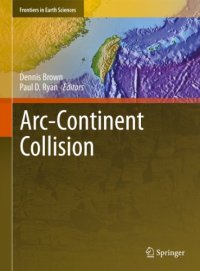
Ebook: Arc-Continent Collision
- Tags: Geology
- Series: Frontiers in Earth Sciences
- Year: 2011
- Publisher: Springer-Verlag Berlin Heidelberg
- Edition: 1
- Language: English
- pdf
Arc-continent collision has been one of the important tectonic processes in the formation of mountain belts throughout geological time, and it continues to be so today along tectonically active plate boundaries such as those in the SW Pacific or the Caribbean. Arc-continent collision is thought to have been one of the most important process involved in the growth of the continental crust over geological time, and may also play an important role in its recycling back into the mantle via subduction. Understanding the geological processes that take place during arc-continent collision is therefore of importance for our understanding of how collisional orogens evolve and how the continental crust grows or is destroyed. Furthermore, zones of arc-continent collision are producers of much of the worlds primary economic wealth in the form of minerals, so understanding the processes that take place during these tectonic events is of importance in modeling how this mineral wealth is formed and preserved. This book brings together seventeen papers that are dedicated to the investigation of the tectonic processes that take place during arc-continent collision. It is divided into four sections that deal firstly with the main players involved in any arc-continent collision; the continental margin, the subduction zone, and finally the volcanic arc and its mineral deposits. The second section presents eight examples of arc-continent collisions that range from being currently active through to Palaeoproterozoic in age. The third section contains two papers, one that deals with the obduction of large-slab ophiolites and a second that presents a wide range of physical models of arc-continent collision. The fourth section brings everything that comes before together into a discussion of the processes of arc-continent collision.
Arc-continent collision has been one of the important tectonic processes in the formation of mountain belts throughout geological time, and it continues to be so today along tectonically active plate boundaries such as those in the SW Pacific or the Caribbean. Arc-continent collision is thought to have been one of the most important process involved in the growth of the continental crust over geological time, and may also play an important role in its recycling back into the mantle via subduction. Understanding the geological processes that take place during arc-continent collision is therefore of importance for our understanding of how collisional orogens evolve and how the continental crust grows or is destroyed. Furthermore, zones of arc-continent collision are producers of much of the worlds primary economic wealth in the form of minerals, so understanding the processes that take place during these tectonic events is of importance in modeling how this mineral wealth is formed and preserved. This book brings together seventeen papers that are dedicated to the investigation of the tectonic processes that take place during arc-continent collision. It is divided into four sections that deal firstly with the main players involved in any arc-continent collision; the continental margin, the subduction zone, and finally the volcanic arc and its mineral deposits. The second section presents eight examples of arc-continent collisions that range from being currently active through to Palaeoproterozoic in age. The third section contains two papers, one that deals with the obduction of large-slab ophiolites and a second that presents a wide range of physical models of arc-continent collision. The fourth section brings everything that comes before together into a discussion of the processes of arc-continent collision.